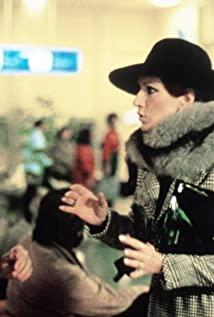"The Cry" is magical and complicated, "Miss" has some strange skills, "Neon Demon" is a feast of light and shadow, and "Aokigahara Tree Sea" is not as bad as in the evaluation. In the end, my favorite of these films was the Spanish national director Almodovar's Julieta.
Coincidentally, on the same day after watching "Julietta", I watched another classic "All About My Mother" by director Almodovar on the big screen of the archive. After two consecutive films, I became more and more fond of the director known as the "Master of Female Films".
The women in Almodóvar's films are always ever-changing, and each woman in his shots and stories is always represented so special and moving, never boring. Not only that, but in his films, men are often presented as women, such as the transvestite male prostitute in "All About My Mother".
Almodóvar excels at discovering the inner beauty of women, and is unique in his skill and ability to shape female characters. Spanish actress Penelope Cruz, for example, in his two films "All About My Mother" and "Return", showed two completely different extremes. In "Return", she is full of makeup, coquettish and beautiful; and in "All About My Mother", the nun she plays is pure, beautiful, innocent and moving, really like an angel who came to the world.
In the film "Julietta", women also occupy the main part of the film, and the male characters may only appear as catalysts for the development of the story. In the movie, Almodovar decisively let her husband, the man, die in a strange way, and then left the three women around him to blame for his life, until finally he was relieved. Such a cruel and desperate story was made somewhat moving by Almodovar.
From the point of view of the heroine Julieta in the film, her life has always been chasing or evading. To put it simply, she was always on the road, from Madrid to Galicia, Andalusia, and back to the original point of Madrid. Julieta was full of dust all the way. In the process, she repeatedly lost the most important people in her life.
First, a mother with some dementia, then a father who was married to a servant, then her cheating husband died at sea, and finally her only spiritual support, her grown-up daughter also left her. Perhaps the lover who didn't appear until Julieta's later years was the happiest time in her life, so in the movie they said to each other: Thank you for not letting me die alone. What a desperate and tender love story.
However, when they discussed everything and were about to leave Madrid to start a happy new life in Portugal, a chance encounter on the street made Julieta's secrets unearthed again, and those memories she was determined to forget swept like a wave. . Julieta was forced to give up the plan with her lover, and those stories about the past were slowly unfolded. This is where the movie officially begins.
In fact, the cause and effect of the story is very simple. Young Julieta met a fisherman on the train, fell in love with him, got married and had children. However, her husband has been cheating on him and maintained a relationship with an artist friend for a long time, arguing that it was just to solve his physical needs. Finally, after a quarrel, the husband went out to sea and encountered a storm and unfortunately died.
Years later, when the daughter learned of the circumstances behind her father's death, she blamed her mother, the artist, and herself for his death. Because, in her opinion, the artist was a major factor in their family feud, her mother's quarrel led directly to her father's death, and she herself couldn't forgive herself because she was happily vacationing at a summer camp at the time.
Therefore, the daughter chose to live in a meditation class when she became an adult, and since then she has left her mother and has never heard from her again. Obviously, this is a punishment for the mother as well as for herself. Mother Julieta's life since then fell into an infinite search for her daughter, lonely and desperate, but she has never made any progress.
As mentioned earlier, women are the most important part of Almodóvar's films. In the movie "Julietta", the three men with a little ink are Julieta's father, husband, and lover in his later years. In fact, the three men have similarities, such as father and husband abandoning their dead wives to find new ones.
Not that such behavior should be condemned, after all their wives are dead. As his father said to Julieta in the movie: Don't I have the right to seek my own happiness after your mother's death? It's just their actions that brought a major impact on Julieta's life and eventually led to her tragic life.
The main story of the movie is unfolded in the form of flashbacks. The past stories and the present state intersect each other, and the current stories are developed while constantly retrospecting the past, which brings some suspense to the film. As the story continues to develop, you will be surprised to find that there are so many people and so many things behind a small incident many years ago. Like the reason for the daughter's departure, the artist's life, the gay plot between the daughter and her friend, it's all slowly revealed.
Real life is like that. There are countless unknown secrets or coincidences hidden behind a seemingly simple matter, and the truth will be revealed after many years or never known. And when you know all this, you're regretful or content, but that doesn't change the situation at the time.
Therefore, Almodovar once said that screenwriters must be close to life, draw nourishment from life, and extract useful details from life in the spirit of creating non-fiction novels. That's the real detail in his films.
Finally, when it comes to Almodovar's films, color is always a topic that can never be avoided. Almodovar is a master of color, and his films are always colorful, giving people the most direct feeling visually. There is always a touch of red in every shot of Almodovar, it can be clothes, wallpapers, necklaces, hair, bags, cars, sofas, everything. Red, warm, wild, passionate, gloomy, deep. Perhaps for Almodóvar, red is everything.
Although "Julietta" lacks some of the drama and humor of Almodóvar's past films, it also maintains the usual theme of his films - the cruelty of life. It's just that in this film, he shows up in a more prosaic way, slowly telling you the story of a broken family.
This article is the first release of the Basel Movie. For reprints, please contact the “Basseur Movie APP” or the “Basseur Movie” WeChat public account (ID: MovieBase)
View more about Julieta reviews











